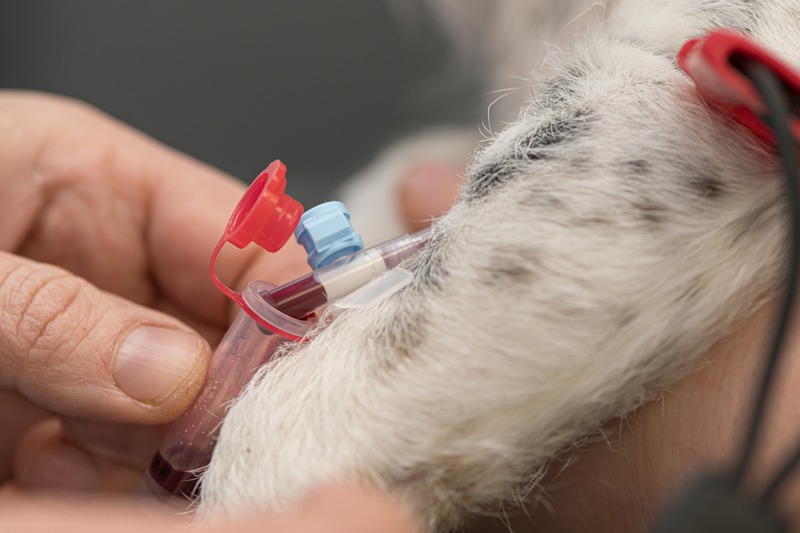Have you ever wondered why your veterinarian suggests blood work for your pet even when it seems perfectly healthy on the outside? It’s a question we often hear, and understandably so. We are often more attuned to the visible cues of our pet’s health and may overlook what’s going on inside their bodies.
Blood work is a valuable tool in a vet’s arsenal for caring for our furry friends, from preventive care to diagnosing potential health issues.
Understanding the Value of Routine Blood Work
Imagine pealing inside your pet’s body to get an instantaneous snapshot of their health – that’s essentially what blood work offers. This non-invasive procedure provides information critical to ensuring your pet’s well-being. Most pet owners only get to see the lolling tongues and wagging tails, but what happens beneath the fur can sometimes tell a different story.
The Basics of Blood Work for Pets
Your pet’s blood can reveal a lot about their overall health. Vets perform two main blood tests on pets: a complete blood count (CBC) and a blood chemistry panel.
-
Complete Blood Count (CBC): This test provides vital information about the types and number of blood cells in your pet’s circulation. A CBC can help detect conditions like anemia, infection, and leukemia.
-
Blood Chemistry Panel: This reveals details about your pet’s organ function, including the liver, kidneys, and pancreas, blood sugar levels, proteins, and electrolytes.
Signs Your Vet Might Look for in Blood Work
When we take a closer look at your pet’s blood work, there’s a whole list of things we’re keeping an eye out for:
-
White blood cell count for immune system health
-
Red blood cell count for oxygen transport efficiency
-
Platelet count for blood-clotting capabilities
-
Liver enzymes to check liver function
-
Electrolytes to ensure proper hydration and bodily function
Preventive Care
So why do we recommend blood work even when your pet shows no apparent signs of illness? Like humans, pets can have underlying issues that aren’t immediately apparent. Catching a condition early can often mean more straightforward and more effective treatment.
Matching Blood Work to Life Stages
As pets age, their bodies change, and different concerns may arise. We suggest periodic blood tests throughout your pet’s life to help us keep track of these changes:
-
Puppies and kittens may need testing to start a clean health slate, and before vaccinations
-
Adult pets benefit from regular screenings to establish health baselines for future comparison
-
Senior pets often require more frequent tests to monitor ongoing health concerns
Veterinary Vaccinations and Parasite Prevention
While discussing preventive care, it’s vital to consider the importance of cat vaccinations in Punta Gorda. These vaccinations are foundational to protecting your pet from various diseases and illnesses, like blood work, and are essential for diagnosing potential health issues. In addition, parasite prevention is part of this preventive care framework, shielding your pet from fleas, ticks, heartworms, and intestinal parasites that can be identified and addressed through regular veterinary visits and screenings.
Providing a Thorough Health Profile
Regular blood work helps vets assemble a pet health profile that becomes incredibly useful over time. This profile is like a map that shows trends in your pet’s health, which can be crucial for early detection of diseases.
Blood Work Before Surgery or Procedures
Whenever your pet needs surgery, even a routine spay or neuter, we recommend blood work to ensure they’re fit for anesthesia and to identify any hidden health concerns that could affect surgery outcomes.
Veterinary Dentistry Services
Our pets can’t tell us when they’re in pain, especially with something as common yet often overlooked as dental issues. This is where dog dentist services come in. Dental examinations and cleanings are vital components of a pet’s health routine.
Poor dental health can lead to systemic issues detectable through blood work, making combining regular dental care with laboratory diagnostics all the more critical.
Blood Work Can Lead to Better Treatments
Every time we run blood tests, we’re compiling data to help tailor treatments to your pet more personally. By understanding what is normal for your pet, we can recognize when something goes off track and find the most effective ways to bring them back to health.
Blood Work as a Diagnostic Tool
If our four-legged friends are ill, blood tests provide crucial insights that can narrow down diagnostics and save time. This means we can start treatment quickly, often before the issue becomes more serious. Some of the conditions that blood work can help diagnose include:
-
Diabetes
-
Kidney Disease
-
Liver Disease
-
Thyroid Imbalances
-
Infections
Veterinary Lab and Diagnostic Services
Now, think of the veterinary diagnostic lab as the epicenter where all this vital blood work analysis happens. These facilities are equipped with state-of-the-art equipment and trained professionals who use blood work results to build a comprehensive picture of your pet’s health, essential for making accurate diagnoses and monitoring ongoing treatments. It’s like having a dedicated detective agency working behind the scenes to uncover the clues hidden in your pet’s bloodstream.
Wrapping Up
Blood work is a gateway to understanding the health mysteries of our pets. It is a precious resource that allows us to probe beneath the surface and catch health issues early on. So, the next time your vet recommends blood work, remember that it’s more than just a routine check-up; it’s a critical step in ensuring your pet lives a long, healthy, and happy life. Let’s work together to keep our furry family members thriving inside and out.


